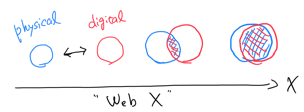Web 3.0, which commonly refers to the technological trends around blockchain and NFTs, is not a substitute for today's Web 2.0 technology (yet). But the trend clearly changes what "literacy" means on the internet, and the new wave requires individuals to have a different mindset.
When people say Web X (X = 1.0, 2.0, 3.0, ...), I personally see X as an indicator of how the physical and digital world are strongly tied to each other; Web 1.0 represents the traditional static websites that were normally treated as a "separate world", whereas Web 2.0 & 3.0 focus more on dynamic user-generated contents that have a direct impact on our day-to-day life.

Our life is supported by the internet at a different level of technological complexity, and as X increases, the norms of real-world societies (e.g., moral and law) become more important to ensure the things comply with security, privacy, and ethics standard. That is, when we publish or consume something on the internet, it is important to have a required level of literacy not to misuse the technology and not to be manipulated by malicious actors.
Here, the level 3 (Web 3.0) is all about decentralization, which:
- strengthens the relationship between digital and physical concepts/events;
- values individual's autonomy;
- changes their incentive model.
Meaning, the role and responsibility of individuals become bigger. Therefore, to support safe & fair adaptation of the technology, "regulation" would play a more important role than it used to in Web 1.0 and 2.0. In fact, you might have heard from people in the NFT communities saying "the regulations haven't caught up with the new technology yet". We have to see how quickly the discussion progresses.
Even though it sounds complicated and challenging, we'd eventually need the corresponding literacy anyway. So, does that mean we need to learn more about the new technologies ASAP e.g., at K-12 education level? Not necessarily. The good news is, at least for now, Web 3.0 is more like a buzzword, and the majority of our life can still be supported by 2.0 (or even 1.0) technology.
Importantly, blockchain is just a tool, and we must focus on a problem itself first and foremost. We should not decentralize the applications for the decentralization sake, as I learned from University at Buffalo's blockchain courses:
they emphasized how focusing on a problem is important for us to apply blockchain techniques. [...] Just like the other advanced techniques (e.g., machine learning), blockchain is not a silver bullet that can resolve arbitrary problems.
There must be real human beings beyond the distributed computing nodes, and hence interacting with the technology with a proper degree of complexity with a corresponding literacy (security, privacy, and ethics) level is critical. It is particularly true after Web 3.0 largely expanded the possibility of applications, but we haven't done a good job even for Web 2.0 yet; unfortunately, the developers have kept leaving a huge room for improvement in the context of ethical product development for the last decade. Starting from a problem (i.e., user's voice)—It is always the foundational step to take.
References:
- Web2 vs Web3 | ethereum.org
- The Architecture of a Web 3.0 application
- What Is Web 3.0 & Why It Matters
Support
Gift a cup of coffeeShare
Categories
See also
- 2023-04-07
- Three Perspectives on Large Language Models and Their Emerging Applications
- 2022-09-22
- Why Your Job Title Matters (Cont.)─Technology for the People
- 2021-04-11
- What Blockchain Brings to Real-World Applications
Last updated: 2022-05-15
Author: Takuya Kitazawa
I am an independent consultant, mentor, and advocate for sustainable technology development with a decade of experience in AI/ML products, data systems, and digital transformation. Based in Canada and originally from Japan, I have lived and worked globally, including part-time residence in Malawi, Africa. See CV for more information, or contact at [email protected].
NowDisclaimer
- Opinions are my own and do not represent the views of organizations I am/was belonging to.
- I am doing my best to ensure the accuracy and fair use of the information. However, there might be some errors, outdated information, or biased subjective statements because the main purpose of this blog is to jot down my personal thoughts as soon as possible before conducting an extensive investigation. Visitors understand the limitations and rely on any information at their own risk.
- That said, if there is any issue with the content, please contact me so I can take the necessary action.